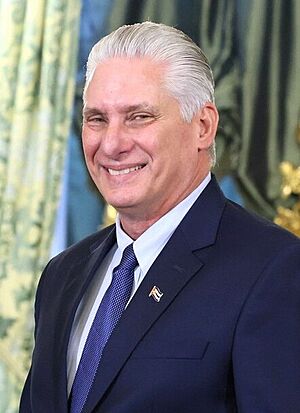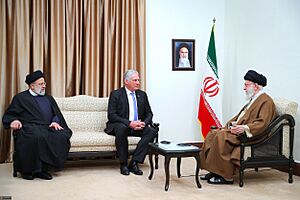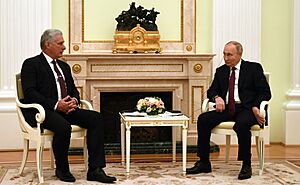Miguel Díaz-Canel facts for kids
Quick facts for kids
Excelentísimo Señor
Miguel Díaz-Canel
|
|
|---|---|

Díaz-Canel in 2025
|
|
| First Secretary of the Communist Party of Cuba | |
| Assumed office 19 April 2021 |
|
| Preceded by | Raúl Castro |
| 17th President of Cuba | |
| Assumed office 10 October 2019 |
|
| Prime Minister | Manuel Marrero Cruz |
| Vice President | Salvador Valdés Mesa |
| Preceded by | Himself (as President of the Council of State) Osvaldo Dorticós Torrado (as President, 1976) |
| President of the Council of State and Ministers of Cuba | |
| In office 19 April 2018 – 10 October 2019 |
|
| First Vice President | Salvador Valdés Mesa |
| Preceded by | Raúl Castro |
| Succeeded by | Manuel Marrero Cruz (as Prime Minister) |
| 19th Vice President of the Council of State and Ministers | |
| In office 24 February 2013 – 19 April 2018 |
|
| President | Raúl Castro |
| Preceded by | José Ramón Machado Ventura |
| Succeeded by | Salvador Valdés Mesa |
| Minister of Education | |
| In office 8 May 2009 – 21 March 2012 |
|
| President | Raúl Castro |
| Preceded by | Juan Vela Valdés |
| Succeeded by | Rodolfo Alarcón Ortíz |
| Personal details | |
| Born | 20 April 1960 Santa Clara, Cuba |
| Political party | Communist Party of Cuba |
| Spouses | Marta Villanueva (divorced) Lis Cuesta Peraza (m. 2009) |
| Children | 2 |
| Alma mater | University of Las Villas (BS) |
| Occupation | Politician |
| Profession | Engineer |
| Signature |  |
Miguel Díaz-Canel Bermúdez (born April 20, 1960) is a Cuban politician and engineer. He is currently the leader of Cuba, serving as the First Secretary of the Communist Party of Cuba since 2021. He has also been the President of Cuba since 2019. As First Secretary, he holds the most powerful position in the Cuban government.
Díaz-Canel followed in the footsteps of the Castro brothers, Fidel and Raúl Castro. He became the first Cuban leader not from the Castro family since 1958. He has been a member of the Politburo, a top political group, since 2003. Before becoming president, he served as Minister of Higher Education from 2009 to 2012. He then became Vice President of the Council of Ministers. In 2013, he was elected First Vice President of the Council of State.
In 2018, he took over from Raúl Castro as President of the Council. After a new constitution was approved in 2019, he became the President of Cuba. On April 19, 2021, he was named First Secretary of the Communist Party of Cuba. This completed the change to a new leadership in Cuba, not based on family.
Contents
Early Life and Education
Miguel Díaz-Canel was born on April 20, 1960, in Santa Clara, Cuba. His mother, Aída Bermúdez, was a schoolteacher, and his father, Miguel Díaz-Canel, worked at a mechanical plant. His family has Spanish roots from Asturias.
He studied at the University "Marta Abreu" of Las Villas and became an electronics engineer in 1982. After graduating, he joined the Cuban Revolutionary Armed Forces. From 1985, he taught engineering at his university. In 1987, he worked in Nicaragua as a leader for the Young Communist League.
Political Journey
Díaz-Canel began working with the Communist Party of Cuba in 1993. A year later, he became the First Secretary of the Party Committee in Villa Clara Province. This was the highest role in the provincial government. He was known for being good at his job. During this time, he supported equal rights for all people, even when it was not a popular idea in the province. In 2003, he took on the same role in Holguín Province. That same year, he became a member of the Politburo.
In May 2009, Díaz-Canel was appointed Minister of Higher Education. He held this job until March 22, 2012. Then, he became Vice President of the Council of Ministers, which is like a Deputy Prime Minister. In 2013, he also became the First Vice President of the Council of State. In this role, he was the main deputy to the President, Raúl Castro.
Becoming President of Cuba
In 2018, Raúl Castro, who was 86 years old, stepped down as president. However, he remained the First Secretary of the Communist Party. On April 18, 2018, Díaz-Canel was announced as the only person to take over as president. He was officially elected by the National Assembly of People's Power and sworn in on April 19. He is the first president born after the 1959 Cuban Revolution. He is also the first president since 1976 who is not from the Castro family.
Soon after becoming president, he met with Venezuelan President Nicolás Maduro. In November 2018, Díaz-Canel traveled to visit many of Cuba's allies in Eurasia. He had diplomatic meetings in Russia, North Korea, China, Vietnam, and Laos. He also made brief stops in the United Kingdom and France. In March 2019, Díaz-Canel and his wife welcomed Charles, Prince of Wales and Camilla, Duchess of Cornwall to Havana. They were the first British royals to visit Cuba.
In October 2019, Díaz-Canel became the President of the Republic of Cuba. This position was brought back after new constitutional reforms were approved in a public vote. This new role replaced the one he had held since April 2018. The position of President of the Council of State became less important. It is now held by Esteban Lazo Hernández.
Díaz-Canel's reforms included limiting the presidency to two five-year terms. They also banned discrimination based on gender or how people identify themselves. His government also updated the country's Family Code in 2022. After a public vote, this new code allowed different kinds of families to be recognized. These changes have been called some of the most advanced in Latin America.
During his time as president, there were protests in Cuba in 2021. These protests happened because of problems made worse by the COVID-19 pandemic. Díaz-Canel's government worked to address these issues. He also changed the currency system.

Leader of Cuba
On April 19, 2021, Miguel Díaz-Canel officially became the First Secretary of the Communist Party of Cuba. This happened after Raúl Castro resigned from the role. This made Díaz-Canel the official leader of Cuba. The BBC reported that Díaz-Canel is loyal to the ideas of the Castro family.
During the 2022 Russian invasion of Ukraine, the Cuban government said the United States was partly to blame for the crisis. Cuba supported Russia's right to defend itself against NATO expansion. However, Cuba did not fully support the invasion. They said the conflict should be solved through talks. Díaz-Canel visited Vladimir Putin in Moscow in November 2022. Both leaders spoke against Western sanctions on Cuba and Russia. They also opened a monument to Fidel Castro in Moscow.
On April 19, 2023, he was re-elected by the National Assembly for a second term as president. Salvador Valdés was elected as vice president. Díaz-Canel won with a large number of votes.
Díaz-Canel has spoken out against the conflict in Gaza. He has called Israel a "terrorist state." He has also led several demonstrations to show support for Palestinians.
Sanctions
The United States placed sanctions on Díaz-Canel on July 11, 2025. Other Cuban officials were also sanctioned. These actions were taken because of concerns about the Cuban government.
Awards and Honors
Miguel Díaz-Canel has received several awards from different countries:
 Angola
Angola
- Order of Agostinho Neto (2019)
 Venezuela:
Venezuela:
- Collar of the Order of the Liberator (2018)
 Vietnam:
Vietnam:
- Order of Ho Chi Minh (2018)
 Mexico:
Mexico:
- Collar of the Order of the Aztec Eagle (2023)
 Portugal:
Portugal:
- Grand Collar of the Order of Prince Henry (2023)
 Namibia:
Namibia:
- First Class of the Order of the Welwitschia (2023)
Personal Life
Díaz-Canel has two children from his first marriage to Marta Villanueva. That marriage ended in divorce. He is now married to Lis Cuesta Peraza.
On March 23, 2021, Díaz-Canel earned a PhD in technical sciences. His research was about how the government uses science and new ideas for Cuba's development.
See also
 In Spanish: Miguel Díaz-Canel para niños
In Spanish: Miguel Díaz-Canel para niños
- List of presidents of Cuba
- List of prime ministers of Cuba



